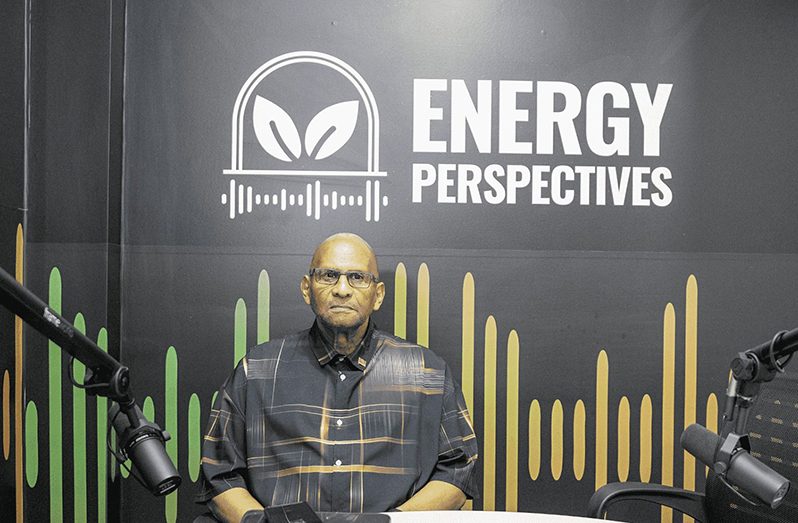–says T&T Diplomat
AS Guyana stands on the precipice of unprecedented economic prosperity fuelled by its significant oil resources, Trinidad and Tobago’s High Commissioner to Guyana, Conrad Enill, has emphasised that realising this potential will require careful management of several key challenges.
Enill’s remarks came during a recent episode of the Energy Perspectives Podcast, powered by the Guyana Energy Conference and Supply Chain Expo, where he discussed the strategic steps needed to ensure that the country’s oil wealth translates into sustainable and inclusive growth for all its citizens.
The diplomat highlighted that while Guyana’s burgeoning oil industry has the potential to transform the nation’s economic landscape, this opportunity comes with its own set of challenges that must be addressed proactively.
He asserted that energy sector revenue can improve any country and in Guyana’s case, it can do so provided the policy prescriptions are implemented correctly, he noted.
“The policy prescriptions have to do with two things: (1) Is the company that is currently involved in the activity globally competitive? That is to say, are the conditions that the government and the country have offered make them competitive; and (2) Are the citizens getting the best return on the investment?”
ExxonMobil Guyana is the operator of the offshore 6.6 million-acre Stabroek Block. Along with its partners Hess Guyana Exploration and CNOOC Petroleum Guyana, a consortium was formed to find and exploit petroleum from the area. ExxonMobil Guyana holds a 45 per cent stake, followed by Hess Guyana Exploration with 30 per cent and CNOOC Nexen Petroleum Guyana with 25 per cent.
The problem that Guyana is currently having, according to Enill, is that, although the government feels that these conditions are met, the people, in some instances, “do not feel the benefits as quickly as you see the other things happening.”
 “For example, you see a lot of infrastructure. You see a lot of changes to roads and schools and so on. But you may not see directly an increase in people’s lending power simply because what is required in the system, the country has not yet developed. So, there is significant potential for growth. There are significant opportunities if people take advantage of them. But it is only in those circumstances that you would see development of the people as oppose to development of the country…”
“For example, you see a lot of infrastructure. You see a lot of changes to roads and schools and so on. But you may not see directly an increase in people’s lending power simply because what is required in the system, the country has not yet developed. So, there is significant potential for growth. There are significant opportunities if people take advantage of them. But it is only in those circumstances that you would see development of the people as oppose to development of the country…”
He stated that T&T, which has been in the petroleum industry for more than a century, has things to teach Guyana. For example, he said that the Twin Island Republic “got it wrong sometimes” since the nation’s development sometimes had an adverse effect on human development.
“In other words, when the country tries to move forward with its infrastructure programmes, goods and services are not keeping [up]with the demand and therefore prices become an issue.
It means, therefore, that the cost of living increases dramatically. The problem with that is that if you do not have a supply strategy to increase supply, people who are on fixed income will find that the cost of living for them is increasing and in some instances impacting them negatively.”
He continued: “So, on one hand, you basically have the country doing well but you have a situation where citizens are not yet at the stage where they can participate in all that is happening. Because the rate of change is too great. That is one of the challenges that Guyana has to leverage.”
Through several calculated initiatives, the Guyana government is utilising oil profits to propel national growth. Building roads, bridges, and ports is an example of infrastructure development that is crucial to improving economic growth and connectivity.
Furthermore, resources are allotted to enhance healthcare and education, guaranteeing enhanced amenities and prospects for the populace. The government is also concentrating on supplying social services to elevate vulnerable people, supporting small businesses, and increasing the availability of inexpensive housing.
To protect future generations and ensure responsible management of the nation’s newly acquired wealth, a portion of the earnings is directed into a sovereign wealth fund.
To successfully harness its oil wealth, Guyana has adopted a strategic approach that involves prudent fiscal management, robust regulatory frameworks, and transparent governance.
The administration has reaffirmed that the resources of oil and gas will benefit every citizen.
In July, just over US$778.6 million, which represents profit oil and royalties for the second quarter of the year, was deposited into Guyana’s Natural Resource Fund (NRF). Sums totalling US$778,637,571.25 were deposited as a result of lifts from the Liza Destiny, Liza Unity and the Prosperity Floating Production Storage and Offloading (FPSO) vessels offshore Guyana.
Since the first discovery in 2015, the consortium has three projects—Liza 1, Liza 2 and Payara—producing over 600,000 barrels a day.
The prolific Stabroek Block has solidified Guyana’s position as a major player in the global oil industry and the fastest-growing economy in the world.
Three other development projects in this block—Yellowtail, Uaru and Whiptail—are set to begin production in 2025, 2026, and 2027, respectively.
Each project is estimated to generate 250,000 barrels per day, bringing the total offshore oil output in Guyana to more than 1.3 million barrels per day. By the end of 2023, ExxonMobil had made $614.6 billion in profits. That profit occurred at a time when the company’s annual revenue was $1.1 trillion and its overall operating expenses were estimated to be $356.1 billion.
The ExxonMobil-led partnership working in Guyana’s Stabroek Block is leading the US$100 million Greater Guyana Initiative (GGI), which is anticipated to last for 10 years.
Launched in February 2021, the initiative is taking a comprehensive strategy to support the country’s development across various sectors. This includes programmes focused on building human capacity, advancing education, food security, improving healthcare and promoting sustainable economic development.




.jpg)










